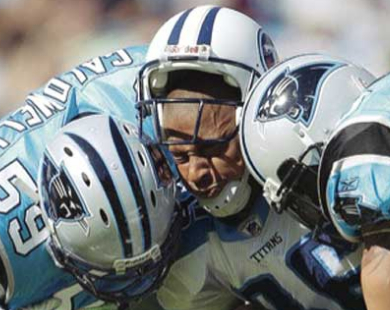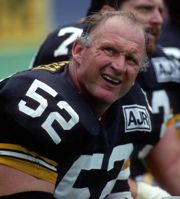Brandon Meriweather is now the most feared hitter in football. Opposing pass-catchers are terrified to go up for a ball with him lurking in the area. If he sees the ball in the air, instead of trying for an interception, he only has a knockout hit on his mind.
Meriweather has paid dearly for his aggressiveness on the field starting in 2010, the year the NFL started to crack down on hits to the head, he was fined $75,000 because of an illegal hit against Baltimore. However, this fine did not seem to deter him and in 2011 he racked up $42,000 in fines as a member of the Chicago Bears. After suffering a season ending knee injury early in 2012, he has returned this season with a vengeance.
Now a member of the Washington Redskins, Meriweather delivered two illegal hits during a game against Chicago on Oct. 20.This caused him to receive a 2 game suspension from the league offices (later reduced to 1 game), on top of another $42,000 fine from earlier in the year.
Meriweather’s response to the NFL’s new safety measures has been a controversial one, to say the least. He is now swearing only to only hit low and during an interview with ESPN 980 he said, “I guess I just got to take people’s knees out. That’s the only way. I would hate to end a guy’s career over a rule, but I guess it’s better other people than me getting suspended for longer.”
He continued, “You just have to go low now, man. You’ve got to end people’s careers. You got to tear people’s ACLs and mess up people’s knees. You can’t hit them high anymore.”
Meriweather kept his word on that promise by going low to take down the Chargers’ Danny Woodhead during a Week 9 win.
We can all agree that Meriweather’s comments were a tad bit over the top, but there is a lot of truth to what he said. Dr. Chris Ropiak has served on the medical staff of the Los Angeles Lakers, Los Angeles Kings, Los Angeles Dodgers and USC Football among others and he is currently a member of Union County Orthopedic Group in Linden, New Jersey.
Dr. Ropiak says that while the NFL has done a great job of limiting head injuries, they may leave themselves vulnerable to more injuries to the lower body.
“It is great to see that the NFL has addressed concussion prevention and given a substantial amount of money towards further research as the long term effects of these repeated traumas is still being discovered. However, with hits now being made lower on the body, we may start to see an increased number of hip, knee and ankle injuries”.
Esquire Magazine got their hands on a document titled “Dangers of the Game”. The NFL players association (NFLPA) used this during its dispute with the owners during the 2011 Lockout. The injury information the NFLPA used was courtesy of footballoutsiders.com
Keeping in mind that the NFL began its crackdown on hits to the head before the 2010 season, here are a few interesting statistics from the document:
· During the 2002-2009 seasons, teams had an average of 3.2 injuries per week. In 2010 the number actually rose to 3.7.
· In 2002-2009 the average time missed because of an injury was 4.3 weeks. Again, that number jumped to 4.7 week in 2010.
· The most shocking statistic was the amount of players placed on season-ending injured reserve (IR). During 2002-2009 seasons 9.8% of injuries required the player to be placed on IR. In 2010 that number jumped to 12.6%.
One of the most recognizable faces in football, Adrian Peterson, says that players have gone for his legs on purpose. He stated that players would be hitting lower at the 2011 Pro Bowl:
“I think the players are getting bigger, stronger and faster. Then again, I think it’s some of the rule changes. Guys are getting fined, $25,000, $50,000 for hits to the heads, so guys are going to try to go for the legs. Stuff like that — they make it to protect the quarterback, but it hurts the integrity of the game, too.”
Dr. Ropiak echoes this sentiment: “Players are getting bigger and faster every year while the hits are not getting any softer. The same level of impact and concussive force is still being applied to the body but just is a different area now. With tackles lower on the body, much of the force is going to be directed toward the hips, knees and ankles. These structures are prone to injury even in the highest level athletes”.
In the years to follow there has been more relevant injuries due to defensive players afraid to hit an offensive player in the helmet. To name a few:
· Adrian Peterson
· Rashard Mendenhall
· DeMarco Murray
· Fred Jackson (twice)
· Knowshon Moreno
· Eric Decker
· Heath Miller
· Nate Burleson
· Marc Mariani
Meriweather has been seen as a “villain” because he is a repeat offender in the NFL’s new player safety program. Roger Goodell has shown a propensity for fining the repeat offenders at the drop of a hat, while being more patient with players who have not hit illegally before. This may be the reason we see some of the NFL’s defenders as villains.
Carolina Panthers Safety Mike Mitchell has also been on Roger Goodell’s “naughty” list for some time now. He has been fined 10 times since he was drafted in 2009 and has paid $45,000 in fines just this season. Mitchell believes that he is being looked at extra closely because he is known as a physical player. “I’m being targeted because I play football physical, but I’m not out here cheap-shoting guys and doing dirty plays like I’ve seen people from Detroit (Ndamakong Suh) do,” Mitchell said, via the Associated Press, “To be honest, I think there is a little bit of a targeting system they have out. I think I’m one of the guys they’d been looking for, but I’m OK with that.”
The NFL’s most famous repeat offender is Cincinnati Bengals LB James Harrison. While a member of the Pittsburgh Steelers, the former Defensive Player of the Year racked up over $100,000 in fines for illegal hits. A famous hit that led to a concussion then-Browns QB Colt McCoy led to Harrison making the same choice as Meriweather, “I’ve really lowered my target area to where it’s down around the knees,” Harrison said on ESPN Radio. “Situations come along where you could tackle the guy high. I don’t do that anymore. I tackle the guy low.”
This choice led to an injury to Denver WR Eric Decker during the 2011 NFL Playoffs. “I could have tackled him high, but if I had hit him high, I probably would have gotten a helmet-to-helmet or something and gotten fined,” Harrison said. “So I hit him low and (he) strained his MCL.”
Harrison makes a point that while concussions are certainly a problem, as a player he would rather get hit high then get hit in the knee. “They’re saying it’s a life-threatening injury to hit a guy in the head and he gets a concussion and so on and so forth, but I think a life-threatening injury is to go low on a guy and blow out his ACL or whatever, and he’s not able to come back the way he was before. Now he can’t make a living, he can’t feed his family, he can’t do what he does. That’s life-threatening to me.”
This is not just a defensive player’s way of looking at it either. Two of the sports best pass-catching Tight Ends agreed wholeheartedly with Harrison:
Tony Gonzalez said, “Hitting a defenseless player in the knee, that’s something we all dread as players. That’s my nightmare. Hit me in my head [instead].”
Here is what Kellen Winslow Jr. tweeted after a low hit from Texans safety D.J. Swearinger led to a gruesome knee injury in the preseason to Dustin Keller:
“Here’s my point. Concussion=missed time pass test your back, Lower Leg injury like DK’s last night=done for season.”
Winslow also had this to say in an interview with Manish Mehta of the NY Daily News:
“I just think the helmet-to-helmet rule is so up in the air,” Winslow added. “They don’t even know what they’re calling…. To protect the concussions, they should mandate mouthpieces. That’s what should really happen.”
The NFL obviously would put its brand first above anything else, and in a way the rule changes could be detrimental to the brand. The stats provided have proven more hits going to the lower body directly correlates to more serious injuries as far as games missed. The NFL definitely wants the best players to be healthy and out on the field, but more injuries to the lower body are going to take out more good players.
Dr. Ropiak stated his opinion about the NFL’s decision:
“The NFL is caught in kind of a pick your poison scenario here. To try and protect one type of hit puts the other at serious risk. A player is going to need both a healthy brain and knee to make a living playing this game. The NFL chose to make this change to protect player’s long-term health over their short-term health.”
He continued: “Football is a violent game. The players know that they are putting their life on the line when they sign up to play. I don’t think the offensive players like the fact that the part of their body that they need the most, is now going to basically be targeted by the defender.”
The players know that there is a very small window for them to earn this type of money playing. The way they see it, is that one bad shot to the knee could close that window, while a bad shot to the head would only sideline them short-term. A player coming back from a knee injury is seen as “damaged goods” in the NFL, meaning no GM will commit to paying that player long term for fear of the knees giving out for good. A player coming back from a concussion usually isn’t even given a second thought. The NFL believes that it has acted in the best interest of the players, but when well-respected players and doctors speak out against the rule put into place, it needs to be revised.







Well said Jim. What Meriweather talked about earlier this season just played out on the field yesterday again when Gronk got his knee taken out by a legal hit.
This was well written by my assistant, assistant contributor Doug. Stay tuned for a JPM special “from the editor” piece on the NFL’s position on whether or not football causes long term damage. Shocking to say the least. It will under the book review section this week.
I understand this is a tough and nasty game but to speak of “taking out someone’s ACL” is premeditated assault for the most part. The pioneers of the game were tough bastards and didn’t have to cripple people. To hear Meriweather talk like that can only make me wish he has a career ending injury before he does the same to others!!